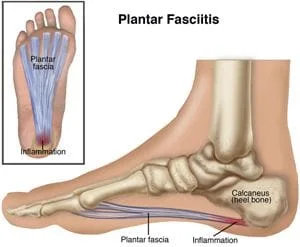
Heel pain that is felt on the underside or bottom of the foot is often caused by an often-painful condition called Plantar Fasciitis.
Plantar Fasciitis, also called a heel spur, causes pain, irritation, and inflammation across the bottom of the foot. The plantar fascia, a ligament that runs from the heel of your foot to the ball, connects your heel bone to your toes. When this ligament becomes strained, it can result in chronic pain.
What Does Plantar Fasciitis Feel Like?
It’s one of the most common causes of foot discomfort, causing a sharp pain that feels like a pin or knife that’s been stuck in your heel when you wake up in the morning and begin walking. Although the pain will start to subside as you move around through the day, it can reappear if you stand for a long period of time, or when you stand up after sitting behind a desk for most of the day.
Who Is Most Susceptible to Plantar Fasciitis?
- Runners and other athletes
- Pregnant women
- People who are overweight and often stand and walk
- People who wear shoes that have little to no support
- People who are getting older
How Is Plantar Fasciitis Prevented and Treated?
- Stretching. Each morning, before taking your first steps of the day, sit with your feet in a 90 degree angle. Get a towel, belt, or rolled up pillowcase (anything that will help with reaching you your foot) and wrap it around your forefoot at the base of your toes. Gently pull your foot back towards your nose. This will help stretch the plantar fascia tendon and get it prepared to step down on the floor. After long periods of inactivity (30 minutes or more), the plantar fascia will need to be stretched again.
- Icing. Every evening, sit with your feet up for 10-15 minutes and apply an ice pack (a bag of frozen peas or carrots works great, too!) to the sore area. Ice is a great natural anti-inflammatory that will help to repair the inflammation in the plantar fascia tendon.
- Orthotics. Wear hard orthotics in your shoes will help support the plantar fascia tendon and protect it from further injury.
- Nonsteroidal anti-inflammatory drugs (NSAIDs). NSAIDs, such as ibuprofen or naproxen, may be taken with direction of a podiatrist or physician.
- Cortisone injections. Cortisone is an anti-inflammatory medication that is injected into the plantar fascia tendon to reduce inflammation and pain. Cortisone should only be administered by a trained podiatrist or physician.
- Extracorporeal Shockwave Therapy (ESWT). ESWT is a nonsurgical method that delivers high-energy acoustic (sound) waves to a targeted area in order to to treat various musculoskeletal conditions, including plantar fasciitis.
So, if you're suffering with heel pain, don't wait for it to become a chronic problem. Contact us today, and we'll get you back, to the activities you love, in no-time.
